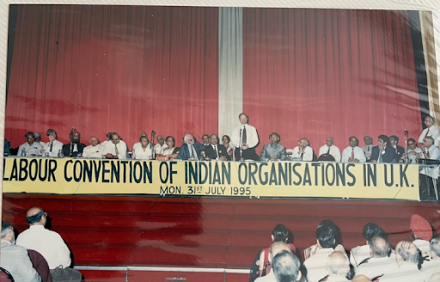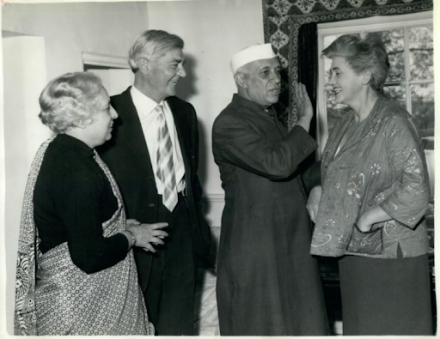
The Labour Party stood shoulder to shoulder with the Indian people as they fought for independence and supported the diaspora as they started their new lives in Britain. In turn, Labour enjoyed the support of Britain’s largest ethnic minority and a close relationship with India. Yet, more recently, the party’s relationships with both have been challenging.
Going unchecked, this is not only a disaster for Labour but also potentially leaves Britain worse off as part of the UK-India relationship for the next 75 years. To coincide with 75 years of India’s independence, however, the Labour Convention for Indian Organisations (LCIO) has been reinvigorated to inclusively connect British Indians to Labour and to engage India on the big issues of our time – namely the climate crisis, sustainable development and enhancing internationalism.

The key to the Labour Party’s strong relationship with the community was through robust institutions that had support from senior party figures. Led by the then Labour councillor Krishna Menon, the India League (now the 1928 Institute) was the preeminent campaigner for Indian independence during the 1930s and 40s. Such institutions had support from senior Labour Party figures such as Harold Laski and Nye Bevan.

When Labour published its 1945 election manifesto, it stated: “The Labour Party will seek to promote mutual understanding and cordial co-operation between the dominions of the British Commonwealth, the advancement of India to responsible self-government and the planned progress of our colonial dependencies.”
In contrast to the Conservative Party at the time, Labour was on the right side of history and championed India’s independence. Yet, despite good intentions, it was Labour’s decision to appoint Lord Mountbatten as the final viceroy, which contributed to the devastating partition of the country.
The first ethnic minorities officer appointed by the Labour Party was in fact of Indian origin, Virendra Sharma, now the MP for Ealing Southall. 75 years on from independence, as we face domestic and international challenges, Labour must handle the UK-India relationship with more sophistication than ever before so that we can help improve the quality of life for millions of people, both here and in India.
India fluctuates between being the second and third largest source of foreign direct investment in the UK. And modelling by the Department for International Trade suggests that a UK-India free-trade agreement could boost UK gross domestic product (GDP) up to around £6.2bn in 2035 depending on the final trade agreement terms. Thus, it is important as a government-in-waiting that we develop a deep, mutually beneficial friendship with India to fully utilise its potential to promote economic security, preventing future cost-of-living crises due to robust supply chains. But long gone are the days of empire, and Labour must treat India like an equal partner.
Yes, India has its problems, but Labour should work to sustain democracy and not feed into the polarisation of Indian political discourse. In the next 75 years (and beyond), the party that oversaw India’s independence and partition must meaningfully engage with the diversity of India as it becomes an economic superpower. This is not only in the national interest but also the global interest.
Labour must ensure, furthermore, that this trade agreement yields more than just financial prosperity for the nation’s capital by ensuring that constituents in places like Stockport also experience the benefits of this renewed economic relationship – particularly given that areas like Stockport were so crucial during Britain’s rise as an industrial powerhouse from the late 18th century. This is a real opportunity to bring the North back to the table to work alongside our Indian peers. If the debate around Brexit taught us anything, it is that the benefits of globalisation must reach the whole country, not just city centres and financial institutions.
The rebirth of Labour’s relationship with India must differentiate itself from the Conservative vision, with a renewed focus on inclusive cultural ties, education and internationalism. Regarding the latter, Labour, unlike the Conservatives, wouldn’t hinder international Covid vaccine distribution and would work with India to promote development in low and middle income countries. Furthermore, Labour should support policies that facilitate the returning of stolen artefacts during colonial rule.
Additionally, Labour should engage with the British Indian community not only as a living bridge with India to promote cinema, poetry and music, but also as a part of its own coalition of partners for electoral success. British Indians aren’t necessarily policy-aligned with the Conservatives – they just feel heard and represented by them. We saw one effect of this when Labour lost Harrow Council to the Conservatives in the recent elections.
Watching British Indians such as Rishi Sunak rise to the top is inspiring for many people in the British Indian community. Organisations such as the Conservative Friends of India regularly engage with the community and organise for the community’s interests within the party. Thus, reinvigorating the Labour Convention of Indian Organisations on India’s 75th Independence Day is crucial for the rebirth of the Labour-India relationship. A relaunched LCIO will focus on:
- Representation – to close the gap between British Indians and the Labour Party;
- A UK-India trade agreement – to engage with India and to foster inclusive sustainable growth for both countries;
- Living bridge – to deepen cultural and educational ties between Britain and India;
- Trusted medium – engage with India as a partner and critical friend on issues of concern for British Indians;
- Global challenges – to address the existential issues of our time such as the climate crisis, food security and inequality; and
- Harnessing potential – to encourage Labour’s utilisation of the vital economic and social contribution of the British Indian community.
You can find more information on our website, as well on Facebook and Twitter.




More from LabourList
Government abandons plans to delay 30 local elections in England
‘The cost of living crisis is still Britain’s defining political challenge’
‘Nurses are finally getting the recognition they deserve’